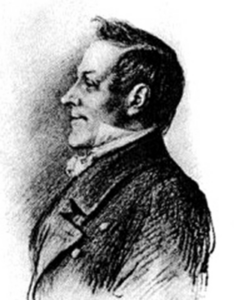The princess's evening song
(Poet's title: Abendlied der Fürstin)
Set by Schubert:
D 495
[November 1816]
Der Abend rötet nun das Tal,
Mild schimmert Hesperus,
Die Buchen stehen still zumal,
Und leiser rauscht der Fluss.
Die Wolken segeln goldbesäumt
Am klaren Firmament,
Das Herz, es schwelgt, das Herz, es träumt,
Von Erdenqual getrennt.
Am grünen Hügel hingestreckt
Schläft wohl der Jäger ein.
Doch plötzlich ihn der Donner weckt,
Und Blitze zischen drein.
Wo bist du, heilig Abendrot,
Wo sanfter Hesperus?
So wandelt denn in Schmerz und Not
Sich jeglicher Genuss?
The evening is now turning the valley red,
Hesperus is gently shimmering.
The beech trees remain particularly quiet
And the river is babbling more gently.
The clouds, lined with gold, are sailing
In the clear firmament;
The heart indulges itself, the heart dreams,
Cut off from earthly care.
Lying out on a green hill
The huntsman falls into a deep sleep –
But suddenly thunder wakes him up
And lightning sizzles around.
Where are you, sacred sunset,
Where are you, soft Hesperus?
Thus it is that with pain and need there is change:
Each delight wanders off.
All translations into English that appear on this website, unless otherwise stated, are by Malcolm Wren. You are free to use them on condition that you acknowledge Malcolm Wren as the translator and schubertsong.uk as the source. Unless otherwise stated, the comments and essays that appear after the texts and translations are by Malcolm Wren and are © Copyright.
☙
Themes and images in this text:
Beech trees Clouds Dreams Evening and the setting sun Gold Green Hearts Heaven, the sky Hesperus, the evening star (Venus) Hills and mountains Hunters and hunting Noise and silence On the water – rowing and sailing Red and purple Rivers (Fluß) Serenades and songs at evening Sleep Storms Valleys
Evening Song
The sun sets. The evening star appears. The sensitive soul reflects on the end of the day and the imminent end of life. The world seems to offer rest and peace. The pious see this as a promise of the new day that will come with the resurrection; the more down to earth just accept the prospect of sleep or death as welcome relief. Such is the content of countless aubades, surely the most popular genre of lyric poetry in the late 18th and early 19th century.
We can rely on Johann Mayrhofer, though, to challenge the conventions. He sets the scene in the normal way, emphasising the gradual change that transforms the natural world as the evening light changes the appearance of the valley and the clouds in the sky. Beech trees seem to stand to attention and hold their breath; the river seems to flow less noisily. The heart responds as expected in verses like this, with a rush of emotion and an indulgence in dreams and fantasy. The experience of paying attention to the world at this liminal moment of sunset seems to release the human spirit from earthly ties. So far, so expected.
Like the hunter at the end of a busy day, we are lulled to sleep by a glorious sunset, but like him too we have to beware. Thunder and lightning come out of the blue and we realise that the sense of repose that we have been enjoying is simply a delusion. We were wrong to feel cut off from the cares of the world. Indeed, there are threats and risks lying in wait that we could not have imagined. The beauty of the setting sun cannot last. The reason why poets respond to this magical moment is not, as they believe, because it unveils the true beauty of the universe that we are unaware of in the busy-ness of daily life but quite the opposite: the setting sun simply offers us a fleeting moment of escapist fantasy.
The Princess
So why did Mayrhofer call his unconventional aubade ‘Evening song of the Princess’? He gives no hint as to which Princess he has in mind, so the reader is left to fill the gaps (or simply to ignore the title).
There are two types of princess: those who are born with the title, whose fate it is to be married off for dynastic or diplomatic purposes (almost certainly unhappily) and those (like Diana Spencer) who become princesses when they get married (and who are equally unlikely to live happily ever after). Mayrhofer, as an Austrian, might have had Princess Marie Antoinette (type 1) in mind. This daughter of Empress Maria Theresa of Austria was married off to the Dauphin of France at the age of 15; she could have had no idea of the thunderstorm of the French Revolution that was about to burst.
☙
Original Spelling Abendlied der Fürstin Der Abend röthet nun das Thal, Mild schimmert Hesperus. Die Buchen stehen still zumahl, Und leiser rauscht der Fluß. Die Wolken segeln goldbesäumt Am klaren Firmament; Das Herz, es schwelgt, das Herz, es träumt, Von Erdenqual getrennt. Am grünen Hügel hingestreckt, Schläft wohl der Jäger ein - Doch plötzlich ihn der Donner weckt, Und Blitze zischen drein. Wo bist du, heilig Abendroth, Wo, sanfter Hesperus? So wandelt denn in Schmerz und Noth Sich jeglicher Genuß.
Confirmed by Peter Rastl with Gedichte von Johann Mayrhofer. Wien. Bey Friedrich Volke. 1824, page 36.
To see an early edition of the text, go to page 36 [50 von 212] here: http://digital.onb.ac.at/OnbViewer/viewer.faces?doc=ABO_%2BZ177450902


